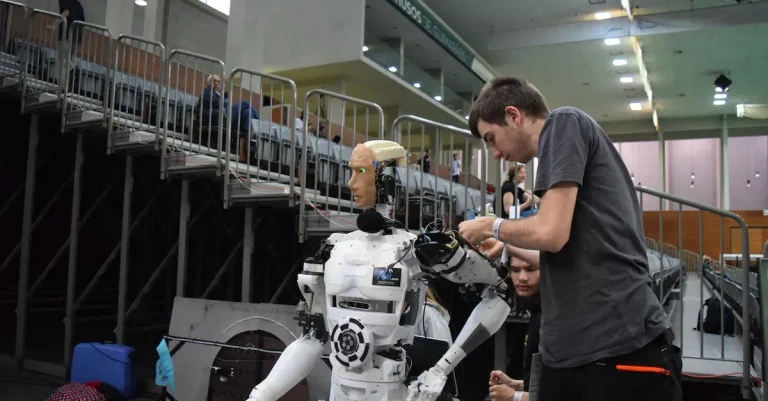Info Science Vs Computer Science: A Detailed Comparison
With the rise of data and technology in the modern world, many students find themselves trying to choose between studying information science or computer science. Both fields involve working with technology and data, but have some distinct differences in their focus and career trajectories.
If you’re short on time, here’s a quick answer to your question: Information science focuses more on the organization, analysis, and management of data and information, while computer science deals more with computation, algorithms, programming, and the creation of software and applications.
In this comprehensive guide, we will dive deeper into the details of these two fields, looking at their origins, subject matter, key concepts, career options, and more. With over 3000 words, we aim to give you a detailed understanding of info science versus computer science so you can determine which one may be the best path for your interests and professional goals.
Origins and History
Information Science History and Background
Information Science, also known as Data Science, is a multidisciplinary field that focuses on the collection, analysis, interpretation, and presentation of data. It emerged as a result of the increasing need for managing and processing vast amounts of information in various industries.
Information Science draws its roots from several disciplines such as computer science, statistics, mathematics, and information theory.
The origins of Information Science can be traced back to the early 20th century when pioneers like Paul Otlet and Vannevar Bush envisioned a world where information could be organized and accessed with ease.
However, it was in the 1960s and 1970s that the field gained recognition and momentum with the development of databases, information retrieval systems, and advancements in computer technology.
Today, Information Science plays a crucial role in various domains such as healthcare, finance, marketing, and social media. With the advent of big data and the rise of artificial intelligence, the demand for skilled professionals in Information Science has skyrocketed.
Computer Science History and Background
Computer Science, on the other hand, focuses on the study of algorithms, computation, and the design of computer systems. It originated as a discipline in the 1950s when researchers like Alan Turing and John von Neumann laid the foundations of modern computing.
The history of Computer Science can be traced back to the invention of the first programmable computer, the Electronic Numerical Integrator and Computer (ENIAC), in the 1940s. This breakthrough led to rapid advancements in computer technology and paved the way for the development of programming languages, operating systems, and the internet.
Over the years, Computer Science has evolved into a diverse field with sub-disciplines such as artificial intelligence, software engineering, computer graphics, and cybersecurity. It has revolutionized industries and transformed the way we live, work, and communicate.
Computer Science professionals are in high demand, with job opportunities ranging from software development to data analysis and cybersecurity.
Key Subjects and Concepts
Information Science Core Subjects
Information Science is a multidisciplinary field that combines computer science, mathematics, and statistics to analyze and interpret complex data sets. Some of the key subjects in Information Science include:
- Data Analysis: This subject focuses on techniques and tools used to extract meaningful insights from large datasets. It involves data cleaning, visualization, and statistical analysis.
- Machine Learning: Machine Learning algorithms are used to build models that can learn from data and make predictions or decisions. This subject explores various algorithms such as regression, classification, and clustering.
- Data Mining: Data mining is the process of discovering patterns and relationships in large datasets. It involves techniques like association rule mining, clustering, and outlier detection.
- Big Data: With the exponential growth of data, handling and processing large datasets has become a crucial aspect of Information Science. This subject covers distributed computing, parallel processing, and storage techniques.
- Information Retrieval: In this subject, the focus is on retrieving relevant information from a large collection of unstructured data. Techniques like text indexing, search engines, and natural language processing are studied.
These subjects equip Information Science professionals with the skills needed to extract valuable insights from data, understand patterns, and make data-driven decisions.
Computer Science Core Subjects
Computer Science is the study of algorithms, programming languages, and computer systems. It encompasses various subjects that form the foundation of computing. Some of the key subjects in Computer Science include:
- Programming: This subject teaches students how to write efficient and reliable code using programming languages like Python, Java, or C++. It covers concepts like data structures, algorithms, and software development methodologies.
- Computer Architecture: Computer Architecture deals with the design and organization of computer systems. It includes topics like processor design, memory hierarchy, and input/output systems.
- Operating Systems: This subject focuses on the design and implementation of operating systems. It covers topics like process management, memory management, file systems, and device drivers.
- Database Systems: Database Systems involves the study of designing, implementing, and managing databases. It covers topics like data modeling, query languages, and database management systems.
- Networks: Networks is the study of how computers and devices are connected to each other. It covers topics like network protocols, network security, and network administration.
These subjects provide Computer Science professionals with the knowledge and skills required to develop software, design computer systems, and solve complex computational problems.
For more information about the subjects and concepts in Information Science and Computer Science, you can refer to the websites of educational institutions like Carnegie Mellon University and MIT.
Tools and Technologies
Information Science Tools
In the field of information science, several tools and technologies are used to extract, analyze, and interpret data. These tools play a crucial role in handling the vast amount of information available today. Some commonly used information science tools include:
- Data Visualization Tools: Tools like Tableau, Power BI, and D3.js are utilized to create visually appealing representations of data. These tools help data scientists in presenting complex information in a more understandable and meaningful way.
- Programming Languages: Programming languages like Python, R, and SQL are widely used in information science. Python is known for its versatility and extensive libraries such as Pandas and NumPy, which facilitate data manipulation and analysis.
R is preferred for statistical analysis and visualization, while SQL is used for querying and managing databases.
- Machine Learning Libraries: Libraries like scikit-learn, TensorFlow, and Keras are essential for implementing machine learning algorithms. These libraries provide pre-built functions and models that enable data scientists to build and train machine learning models efficiently.
- Big Data Frameworks: Frameworks like Apache Hadoop and Apache Spark are used to process and analyze large datasets. These frameworks offer distributed computing capabilities, making it possible to handle massive amounts of data.
These are just a few examples of the tools used in information science. The field is evolving rapidly, and new tools and technologies are constantly being developed to enhance data analysis and decision-making processes.
Computer Science Tools
In the realm of computer science, various tools and technologies are employed to design, develop, and optimize computer systems and software. Some commonly used computer science tools include:
- Integrated Development Environments (IDEs): IDEs like Visual Studio, Eclipse, and PyCharm provide developers with a comprehensive set of tools for writing, debugging, and testing code. These IDEs often have built-in features that enhance productivity and facilitate collaboration.
- Version Control Systems: Version control systems such as Git and Subversion help in tracking changes to source code and coordinating work among multiple developers. These tools enable collaboration, maintain code integrity, and provide the ability to revert to previous versions if needed.
- Testing Frameworks: Testing frameworks like JUnit, pytest, and Selenium are essential for automating the testing process. These frameworks provide a structured approach to testing software, ensuring its functionality, reliability, and performance.
- Virtualization Tools: Virtualization tools like VMware and VirtualBox enable the creation and management of virtual machines. These tools help in running multiple operating systems on a single physical machine, facilitating software development, testing, and deployment.
Computer science tools are diverse and cater to different aspects of software development and system optimization. They continue to evolve as technology advances and new challenges emerge.
For more information on information science tools, you can visit KDnuggets. To learn about computer science tools, you can explore Computerworld.
Career Paths and Options
Information Science Careers
Information science offers a wide range of career paths and options for individuals who are passionate about data analysis, information management, and problem-solving. One of the most sought-after roles in information science is that of a data scientist.
Data scientists are responsible for collecting, analyzing, and interpreting large datasets to extract meaningful insights and make informed business decisions. They are in high demand in various industries such as finance, healthcare, and technology.
Another career option in information science is that of an information architect. Information architects design and organize information systems to ensure that users can easily access and retrieve the information they need.
They work closely with user experience designers and developers to create intuitive and user-friendly interfaces.
Additionally, information science offers opportunities in fields such as data engineering, database administration, and information security. These roles involve managing and maintaining databases, designing secure systems, and protecting sensitive information from unauthorized access.
Computer Science Careers
Computer science also provides a multitude of career paths and options for individuals interested in technology and software development. One popular career choice in computer science is that of a software engineer. Software engineers design, develop, and test software applications or systems.
They are responsible for writing code, debugging programs, and ensuring that software meets the desired specifications.
Another career option in computer science is that of a cybersecurity analyst. With the increasing prevalence of cyber threats, cybersecurity analysts play a crucial role in protecting organizations’ digital assets.
They analyze systems for vulnerabilities, develop security measures, and respond to security incidents to prevent data breaches.
Computer science also offers opportunities in areas such as artificial intelligence, computer networking, and web development. AI specialists work on developing intelligent systems and algorithms, while network administrators ensure the smooth functioning of computer networks.
Web developers create and maintain websites, ensuring that they are user-friendly and visually appealing.
It is important to note that both information science and computer science offer diverse and promising career paths. The choice between the two ultimately depends on an individual’s interests, strengths, and career goals.
Some individuals may be more inclined towards data analysis and information management, while others may prefer software development and technology innovation.
For more information on information science careers, you can visit Bureau of Labor Statistics. For computer science careers, you can explore opportunities on websites like Computer Science.org.
Academic Pathways
Information Science Degrees
Information Science degrees are designed to equip students with the knowledge and skills needed to handle and analyze large amounts of data effectively. These programs focus on the study of data collection, storage, retrieval, and analysis, as well as the development of information systems and technologies to support these processes.
Students pursuing a degree in Information Science can expect to delve into subjects like data management, data visualization, data mining, machine learning, and information architecture. They learn how to extract valuable insights from data and use it to make informed decisions in various industries.
Some popular Information Science degree programs include Bachelor of Science in Information Science, Bachelor of Information Technology, and Master of Information Science. These programs often offer specialized tracks or concentrations, such as Data Analytics, Information Systems, or Human-Computer Interaction.
Computer Science Degrees
Computer Science degrees focus on the study of algorithms, programming languages, software development, and computer systems. This field of study revolves around the design and development of computer software and hardware, as well as the understanding of computational theory and problem-solving techniques.
Students pursuing a degree in Computer Science can expect to learn various programming languages, such as Python, Java, or C++, and explore topics like data structures, algorithms, computer architecture, and software engineering.
They develop the skills needed to create innovative software solutions and tackle complex computational problems.
Popular Computer Science degree programs include Bachelor of Science in Computer Science, Bachelor of Computer Science, and Master of Computer Science. These programs often offer specializations in areas like Artificial Intelligence, Software Engineering, or Cybersecurity.
Comparing the two:
While both Information Science and Computer Science degrees involve working with data and technology, their focuses and applications differ. Information Science emphasizes the utilization of data and information systems for decision-making and problem-solving, while Computer Science focuses on the development of software and computer systems.
Information Science professionals often work in roles such as data analysts, data scientists, or information architects, where they handle and analyze data to extract insights and support decision-making processes.
On the other hand, Computer Science professionals typically work as software developers, programmers, or system administrators, building and maintaining software applications and computer systems.
It’s important to note that the boundaries between these fields are not rigid, and there can be overlap in certain areas. For example, a Computer Science graduate may specialize in data science or pursue a career in information systems.
Similarly, an Information Science graduate may acquire programming skills and work as a software developer.
Ultimately, the choice between an Information Science or Computer Science degree depends on an individual’s interests and career goals. It’s advisable to research the curriculum and career prospects of each program to make an informed decision.
Conclusion
In summary, while information and computer science have some overlap, they have distinct histories, subjects, tools, careers, and academic pathways. Information science focuses more holistically on the life cycle of information, leveraging technology to collect, organize, analyze, and share data.
Computer science deals more directly with computation, programming, algorithms, and the creation of software and applications.
When choosing between these two fields, consider your interests in working with technology, your career goals, and whether you want to focus more on software development or information management. Both fields are growing in demand and offer dynamic, promising career routes.
By understanding the core differences outlined here, you can determine which discipline aligns best with your aspirations.







